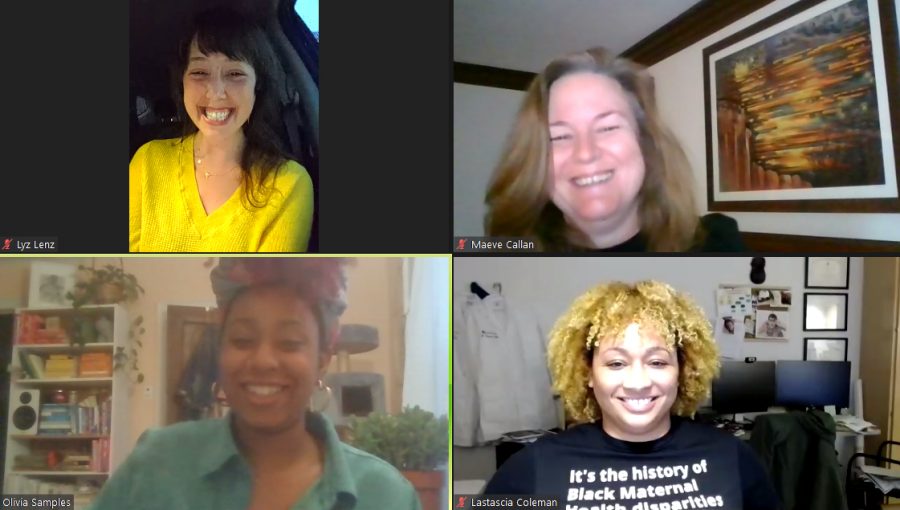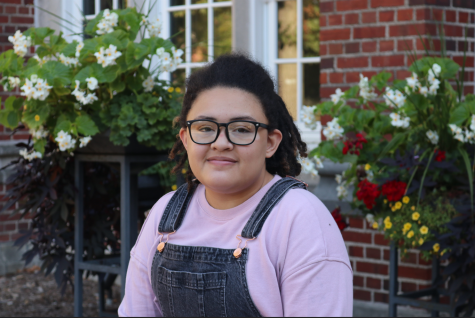Panelists speak out about dealing with the maternal health crisis
Professor Maeve Callan introduced the panelists.
March 31, 2021
Three panelists spoke to the Simpson community on March 25 about maternal health and reproductive justice over Zoom.
The event was hosted by Maeve Callan, chair of the religion department and director of the women’s and gender studies program. During the panel, speakers discussed maternal health and reproductive justice. The panelists included doula and Simpson alumni Olivia Samples, nurse midwife Dr. Lastascia Coleman and Lyz Lenz, author of “Belabored: A Vindication of the Rights of Pregnant Women.” The panelists also spoke about maternal health disparity, lack of access to maternal healthcare and a bereavement bill that was passed in New Zealand.
Samples, whose doula business focuses on Black and queer families, said she became a doula after learning about the Black maternal health crisis in 2019. The Black maternal health crisis, or Black maternal mortality crisis, refers to According to the Centers for Disease Control and Prevention (CDC), Black, Native American and Alaska Native women are two to three times more likely than white women to die due to pregnancy-related complications, and 60% of childbirth-related deaths are preventable.
“In some ways, we know the maternal health disparity isn’t just maternal mortality disparity,” Samples said. “There’s also an infant mortality disparity and many other health disparities relating to maternal health. In discovering some of those other health disparities, I’ve gotten into a lot more medical advocacy in my community, which has led to deeper policy and advocacy work at the state level, with the black liberation movement and Des Moines.”
Coleman is working to improve reproductive justice and access to maternal healthcare services in Iowa. One barrier to access, Dr. Coleman said, is the increase in hospital systems affiliated with religious organizations, which has resulted in increased loss of access to reproductive healthcare.
“I know one of the health systems in the Waterloo area,” Coleman said. “The hospital will no longer do any type of contraception. They will not do vasectomies; they will not do tubal ligations. That was a mandate from the Catholic Church, so it’s one person’s opinion or decision which affects an entire community. You have to go somewhere else to access those [maternal healthcare] services if you need them. You can’t even try to do it within your community.”
The Bereavement Leave for Miscarriage Bill, which passed Wednesday in New Zealand’s parliament, was also discussed. The bill, which received unanimous support, approves three days of paid leave for parents dealing with loss due to miscarriage or stillbirth. Though, according to The Guardian, people whose pregnancy ended through abortion will not be able to apply for bereavement leave. The bill also came in an effort to end the stigma around miscarriage, and to prevent parents from needing to use sick leave to take time to grieve.
Lenz spoke about her own experience with miscarriage and the impact policies on reproductive healthcare and justice can have on women. While New Zealand is passing the Bereavement Leave for Miscarriage Bill, states like Iowa are making access to reproductive healthcare increasingly difficult.
“It’s [miscarriage is] traumatic, it’s hard and it is also part of life,” Lenz said. “And there’s also a lot of states that have criminalized miscarriage, too. Having a country that sets policies that show an understanding of not just women’s bodies but shows respect to them [women’s bodies] on a policy level. ‘You are valued in our society, and we rely on you. We will give you the things that you need to live and survive and recover, and get the care that you need without having to worry about your next paycheck.’ I think that’s essential. Culture doesn’t change until policy changes, so without those policy changes we will not see our culture change.”
The panelists also spoke about the decreasing amount of maternity wards in Iowa, adding to the issue of lack of access to maternal healthcare, and what a solution would look like. Samples hopes her doula business will help families learn to care for themselves and spread generations’ worth of knowledge.
“As we’ve seen throughout history, when systems have excluded us [Black people] or not worked for us have created our own systems that work a lot better,” Samples said. Looking at the Black Panthers free breakfast programs, that’s one of the most famous projects. A community-based doula/midwifery program would be a powerful way to circumvent a medical system that doesn’t see us or honor us and never has. My vision for the future: I hope that people don’t have to pay dues anymore. I hope that that’s just that kind of care for human beings as inherent to their health care.”
Coleman agreed and said she is working as program director on starting a nurse-midwifery education program. She hopes to begin the first classes next year, and she thinks Iowa needs more birth centers.
“An ideal model, both for patients and for doulas and their lifestyle is to have a model where there is a doula in the community or group of doulas in the community who can help people get through the prenatal period and be there for them in the postpartum period. If they wanted to have those same doulas be in the hospital with them they would be available, but there would also be doulas available in the hospital to work with people,” Coleman said.







